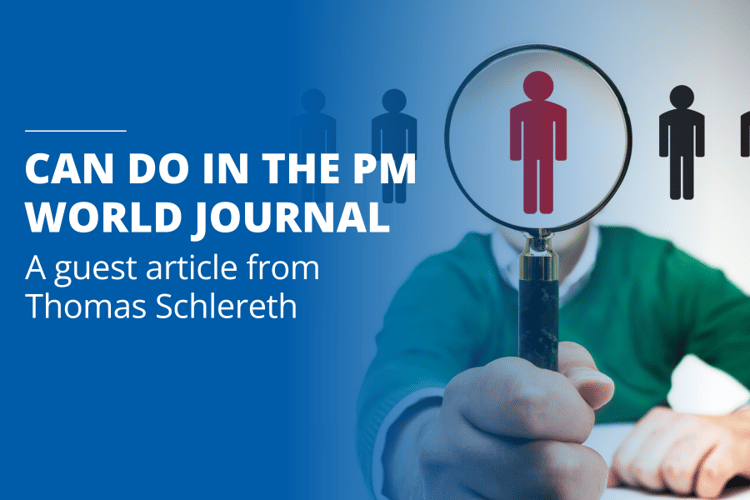As CEO and head of development at Can Do, Thomas Schlereth is also a sought-after interviewee at trade magazines, podcast hosts and organizations dealing with project management and resource management. Recently, he wrote an article for the PM World Journal, which we also publish here.

"The PM World Journal is intended to be a global resource for continuous learning and knowledge sharing related to Program and Project Management (P/PM). It is intended to help advance the global project management profession and to promote professional P/PM in support of positive economic, political and social development around the world." So much for the Journal's mission. Issue 4 April 2023 contains an article by Thomas Schlereth, CEO of Can Do. We are happy to make it available to the readers of our blog here:
Machines don't know any sensitivities: Objective resource management
Thomas Schlereth
Rose is in a rage
People are the most important - and most expensive - asset in projects. But they are also the greatest risk ... Project manager Rose has to experience this in her daily work. As an experienced project professional, she naturally knows the usual resource risks and prices them accordingly in the planning. These include, for example:
- Estimates of resources for workloads and time requirements turn out to be too optimistic.
- Resources are repeatedly diverted to other work.
- Cross-project overloads are ignored by the resources themselves or by other project managers.
- Employees repeatedly drop out - for example, due to illness or vacation.
- Project parameters such as "time" or "budget" change and affect resource requirements.
Rose can handle all that. But what makes her despair and downright angry is that her projects are constantly in competition with other departments and projects. They book employees for their own projects and don't listen to Rose when she warns that her own projects are in danger of falling through. So she keeps buying in freelance externals to keep her projects somewhat on track. Rose decides: This can't go on!
Intransparency meets ignorance
Projects in multi-project landscapes develop their own dynamics and follow their own laws. This includes a lack of transparency (depending on the software used): It is often completely unclear what people are working on, what work they have completed, and what their current workload is.
The reason for this is that actual capacity information is provided digitally by resources, project or team leaders late or not at all. As a result, resources are not allocated according to real needs, but according to who announces the loudest need. And this in turn results in employees who are either completely overloaded or have nothing to do.
Of course, PMOs are familiar with this situation and have learned to live with it. Unfortunately, this often leads to the fact that project managers like Rose are simply ignored when they warn - for good reasons - about miscasts in the projects, lack of resources and projects that are out of balance. An ignorance that, in the worst case, leads to negative cascading effects across the entire company.
It's about skills
The importance of people for project management has already been described at the beginning, but actually this assessment is not precise enough: In fact, well-functioning project management is not about manpower per se, but about skills. An employee with profound knowledge of digitization is not optimally staffed on the store floor in a purely mechanically oriented project - just like the HR specialist in a supply chain project. Project managers know this, of course, but are often happy enough that project management has assigned them resources in the desired number and deployment time at all ...
In order to run large project organizations with as little friction as possible, it is essential not to limit resource management to quantity (manpower and time), but to focus on skills. To return to the human factor, this is rarely possible in an objective and unbiased manner.
It's about objectivity
The scramble for resources, which our project manager Rose also has to deal with, is usually rooted in sensitivities: Because - fortunately! - every project manager is fully committed to his or her projects, sometimes more resources are requested than are actually necessary. Just in case, so to speak. The fact that skills are then lacking in other projects is not necessarily of interest. What is needed here, especially in portfolio management, is an objective, incorruptible authority that does not favor one project over another. Again, such an authority can hardly be human - but an AI can!
Artificial intelligence for more humane projects
The importance of software support in resource management has been mentioned several times now; here is a summary on why the conclusions of an Artificial Intelligence are clearly preferable to human decision making in this regard:
- An AI that is trained accordingly does not support any particular interests. Rather, it is "interested" in the joint success of all those involved.
- An AI has no sympathy or antipathy toward individuals and always evaluates risks "objectively".
- An AI can adapt.
- An AI will never lose track of even the largest portfolios.
- An AI will always classify project risks based on facts and neither overestimate nor "sweep them under the carpet".
As a result, we can say that it is the use of digital high-tech, such as special algorithms or artificial intelligence, which makes projects and portfolios more "human", because:
- Resources are distributed objectively and fairly.
- Team members are encouraged and challenged, but not overburdened.
- Project management can concentrate on its project competence instead of being exposed to competitive battles.
- Complex analyses of problems are carried out by the machine. The human is only presented with the final problem for solution.
- The core formula of the "project evolution" is no longer "survival of the fittest", but "success for the best teams".
What is Rose doing?
In the future, Rose will rely on a project management software that replaces the previous "resource management on demand" with skill management based on a specialized algorithm and using AI. This gives her several advantages at once:
- Your teams are always optimally staffed and efficiently reach the project goal.
- The team members are utilized to such an extent that they can unfold their full capacity - and do so gladly and with motivation.
- AI-driven risk management keeps smaller problems, which experience has shown to take care of themselves, away from Rose. Instead, those risks that require their full attention are brought to the front.
- The consistent use of algorithms and AI gives Rose a fact-based foundation for her project decisions.
- AI's recommendations and risk indications can be implemented by Rose - but they don't have to be. Above all: She can always refer to an objective assessment of the actual situation and no longer has to defend her projects internally within the company.
- Project management software turns project data into helpful information that can be shared directly with stakeholders.
Conclusion
Rose has done it right: By utilizing modern PM software, her projects are more transparent, her decisions are reinforced, and her projects are more efficient. While optimizing the standing of her teams in the company, she almost incidentally strengthens all other projects across all departments, because the software's AI helps her with resource allocation and risk assessment across the portfolio.
Would you like to read the original article in the context of the Journal?
Click here for the PM World Journal
Jetzt anmelden - Can Do Newsletter
As a member of the management board, Thomas is responsible for the operative management of the development including conception, design and further development of the software. He also advises customers on best practices and supports the roll-out.
Why Do Projects Fail? 5 Common Reasons - And How to Avoid Them
Projects are often complex, and even with the best intentions and a competent team, success can elude us. But why do so...
Cost-Cutting - Increasing Efficiency Without Additional Resources
Cost-cutting is currently at the top of the agenda for many companies. In the face of economic uncertainty and rising...
.png?width=200&height=80&name=CanDo%20Logo%20transparent%20(500%20x%20200%20px).png)

